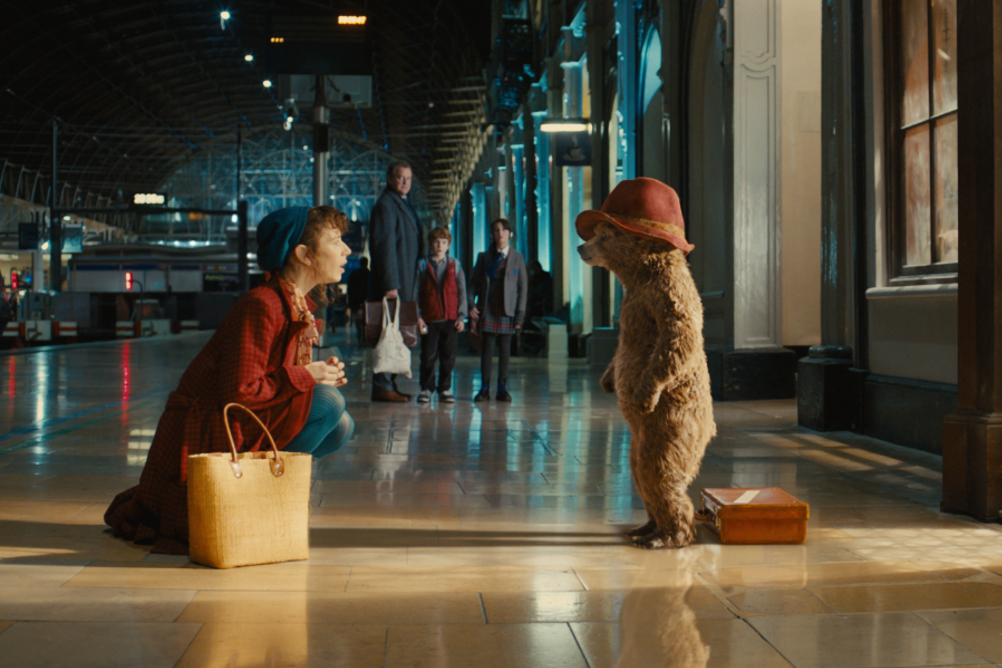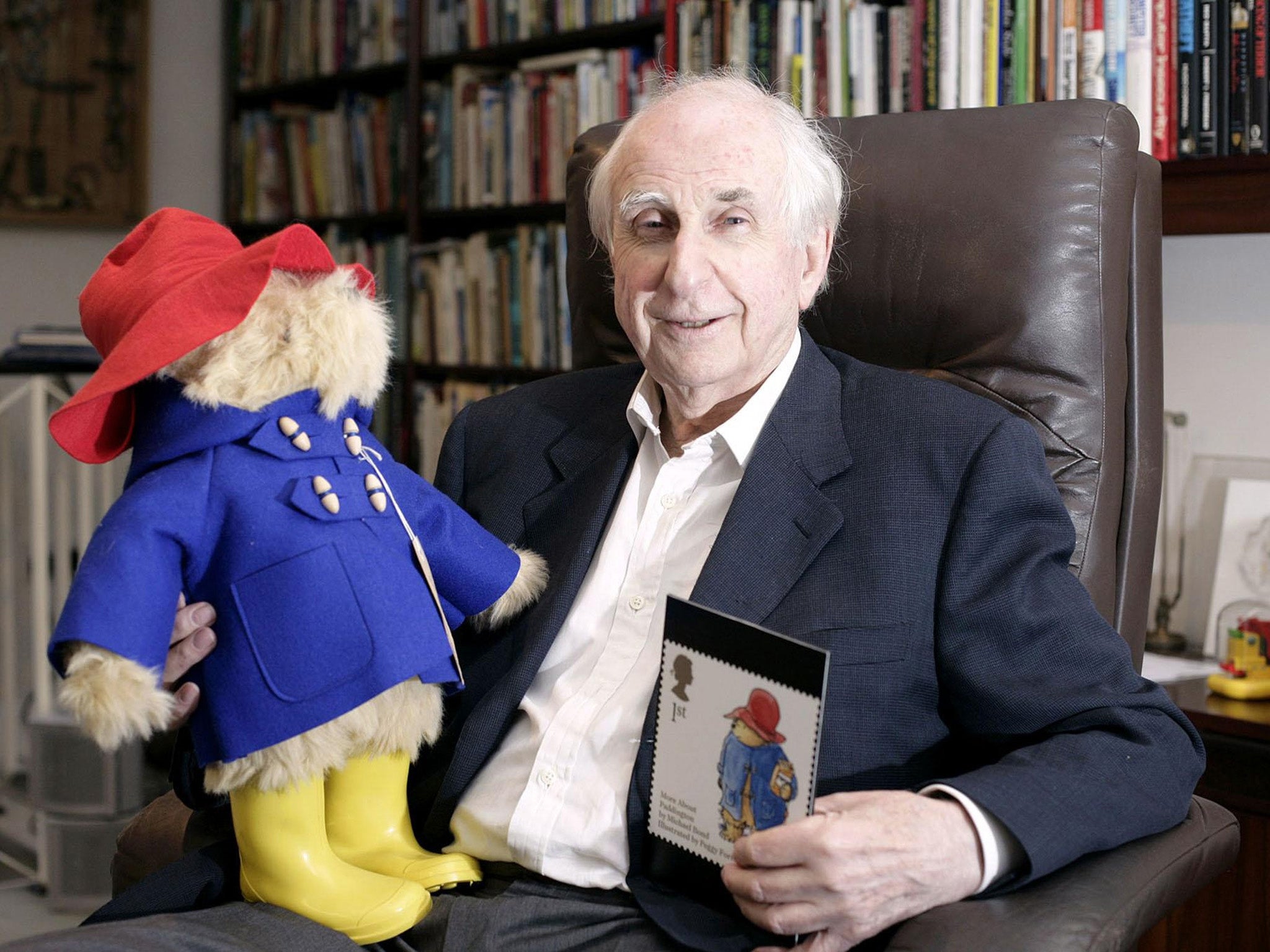Paddington Bear: The story of the refugee and a message of kindness
The children’s author Michael Bond left a literary legacy of inclusion and tolerance

A children’s story about a bumbling bear with a heart of gold is perhaps not the first place you would expect to glean insights into the trauma of the Second World War or the plight of the refugee. But Michael Bond’s Paddington was born into a world torn to pieces by a destructive conflict. His story is that of the refugee – and it remains as relevant today as it was when Bond, who died last month aged 91, created him in the 1950s.
Paddington comes out of a certain kind of war trauma. Newsreel footage of the Nazis moving people out of their homes in the 1930s stuck with Bond: “Footage of elderly people pushing prams with all their belongings in them. Refugees are the saddest sight – I still think that,” Bond said in 2014 – just as his creation was about to reach a new generation with a big-screen adaptation.
There had been no shortage of trauma for Bond himself. He left school very young and was 17 when he volunteered for aircrew service in the RAF. He joined up after surviving a serious bombing raid in Reading that killed many of the people working in his building. But flying didn’t agree with him – so, after suffering chronic airsickness, he moved to the Middlesex regiment of the British Army.
Still a child himself, the war transformed Bond and perhaps also globalised him, pushing back the borders of his vision of the world to encompass other places and peoples. For although he sets his Paddington stories in a safe middle-class house in west London, Paddington himself comes from elsewhere, somewhere so farflung to be the other side of the world – “Darkest Peru”.
The stowaway and his label
As a stowaway Paddington travelled illegally by boat and was taken in by comfortably off London family. But the bear’s famous label is also very important, signalling his role as a figure for a series of memories about the trauma of the war. Bond recalled watching images of evacuee and refugee children wearing labels at train stations.
Speaking to The Daily Telegraph in 2007 Bond said: “Living in Reading during the war, I can remember train-loads of refugees coming down from London. A lot of the children had luggage labels round their necks with their names and addresses on them ... I felt it would say a lot about the Brown family that they were prepared to take in a refugee like Paddington.”

Bond bears witness to experiences of the huge numbers of people displaced by the Second World War, and of refugees and migrants in the postwar era who might combine to create a sympathetic character in Paddington. There is also a strong ethical message in Bond’s writing: of the value of hospitality.
At the time of writing the first Paddington book in 1962, Bond lived in a flat on the Portobello Road with his first wife, not in the large middle-class house with housekeeper that he imagined for the book. This part of west London was a key site of immigration, its cosmopolitan population associated with the arrival of Caribbean workers in the postwar era and refugees from across Europe.
Paddington’s great ally, Mr Gruber, runs an antique shop there – this character was based on his literary agent Harvey Unna, a Jewish refugee from Nazi Germany. In 2014, Bond told the Telegraph that his main complaint about the film adaptation of Paddington was he wanted someone foreign to play Gruber, “because he was based on my first agent, a lovely man, a German Jew, who was in line to be the youngest judge in Germany when he was warned his name was on a list, so he got out and came to England with just a suitcase and £25 to his name”.

Mr Gruber is tolerant and hospitable, educated and a guardian of all that is precious and beautiful from the past. And as an older more experienced refugee, he plays a valuable role in signposting for Paddington the way to negotiate a safe place in an alien culture and how to cope with the trauma of uprooting and remaking “the self”. It is this vulnerability, moved from fiction to reality, that the playwright Michael Morpurgo believes makes the Paddington story powerful to this day. “We only have to see that bear to see the predicament of a Syrian child,” he wrote in The Guardian last month.
Bond’s own commitment to refugees continued until his death. In 2009 he led a campaign – along with more than 60 children’s authors and illustrators – to highlight the Government’s continued detention of hundreds of child asylum-seekers in prison-like conditions. Their letter to 10 Downing Street was accompanied by a message attributed to the famous bear. Paddington said the plight of refugees reminded him how lucky he was to be living at number 32 Windsor Gardens “with such nice people”.
Generations of readers have stood in Paddington’s shoes. Maybe that was Bond’s greatest gift to us. He encouraged us not to see refugees as scary “others” – but as people who may just appreciate a warm hug and a marmalade sandwich.
Eleanor Byrne is a senior lecturer in English at Manchester Metropolitan University. This article was originally published on The Conversation (www.theconversation.com)
Join our commenting forum
Join thought-provoking conversations, follow other Independent readers and see their replies
Comments
Bookmark popover
Removed from bookmarks